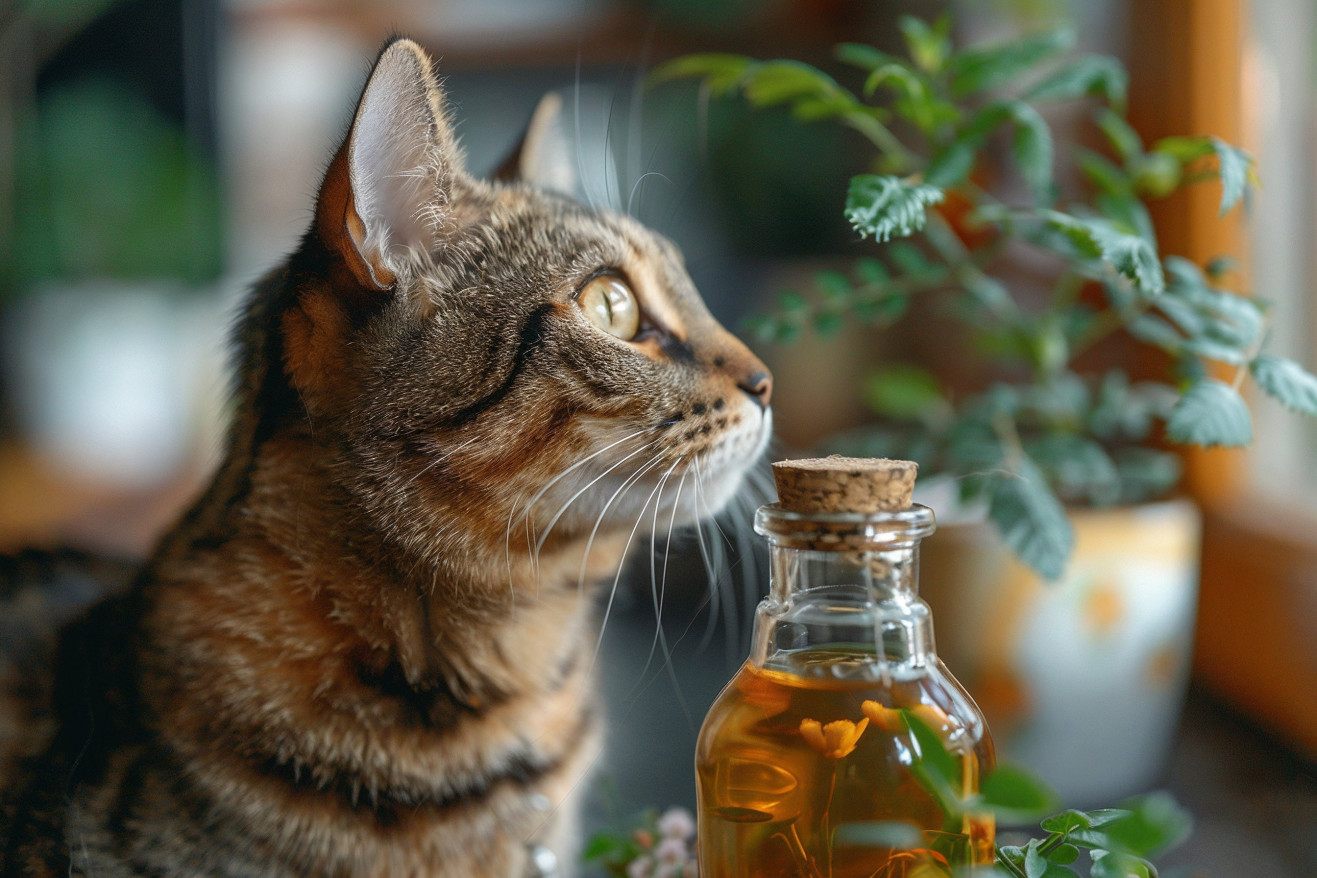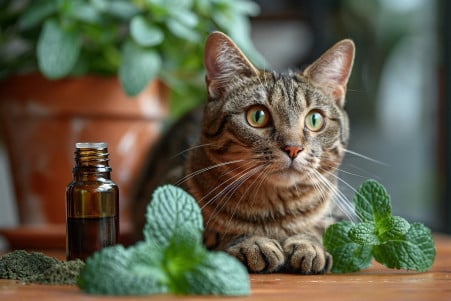Can You Use Neem Oil on Cats? The Pros and Cons
11 May 2024 • Updated 10 May 2024

Many people who own cats have probably asked themselves this question at some point. Neem oil is a natural insecticide and fungicide that can be used in a variety of ways, but is it safe to use around your pets?
The good news is that neem oil is safe to use around cats as long as it is used properly - it's non-toxic if ingested in small amounts and many commercial cat products even use diluted neem oil to help keep fleas, ticks, and other pests at bay.
In this article, we'll take a deep dive into the latest veterinary studies to find out what the pros and cons are of using neem oil around cats. From looking at how effective it is at keeping pests away to learning about the precautions you need to keep in mind, this article will help you decide if you want to use this natural product as part of your cat's care routine.
Is neem oil safe for cats?
What Are the Benefits of Neem Oil for Cats?
Neem oil is often marketed as a natural insect repellent and skin remedy for pets, and it contains several compounds that may be beneficial for these purposes, including omega fatty acids and triterpenes like azadirachtin and nimbin. According to PetMD, these compounds have insect-repelling, anti-inflammatory, antiseptic, antifungal, and antihistamine properties. When applied to the skin in the proper dilutions, neem oil can be used to repel and kill fleas, ticks, and other biting insects on pets, although its efficacy may vary based on the concentration and frequency of application.
Some studies have shown that neem oil can be used to treat ringworm, mange, hot spots, and skin irritation in pets, although there are no definitive studies that have proven that it can be used to treat these conditions in cats. Although neem oil may be a viable alternative to chemical pest control products, veterinarians recommend that pet owners use it with caution and not as their only means of protection. It's also important to make sure that neem oil is properly diluted and to consult a vet before using it on cats.
Neem Oil for Cats: Risks and Side Effects
According to one study, ingestion of concentrated neem oil can cause immediate symptoms such as vomiting, drooling, and breathing problems in cats. Meanwhile, other research has shown that chronic exposure to neem oil can lead to kidney and heart problems in cats. In addition, a study on neem oil's adverse reactions found that topical application of undiluted neem oil can cause skin irritation and dermatitis in cats.
Neem oil can also have interactions with medications, so it should be used with caution, especially in cats. If you suspect your cat has been exposed to neem oil, the study on neem oil's toxicity to cats recommends isolating the cat, washing off any oil, watching for symptoms, and calling a veterinarian immediately. Because of these risks, it's best to look for safer, more natural alternatives to neem oil for flea and tick control in cats.
Safe and Natural Flea and Tick Control for Cats
Many traditional flea and tick products contain pesticides that are dangerous for both pets and people, per the Natural Resources Defense Council (NRDC). Some of the safer natural options for flea and tick control are soap and water, beneficial nematodes, and diatomaceous earth. However, PetMD warns that some natural ingredients, including pyrethroids, pennyroyal, and essential oils, can be toxic to cats.
Homemade products like mosquito repellent sprays, tick repellent sprays, and natural flea control sprays can work and are safe for pets, according to The Whole Pet Vet and Wellness Center. In addition, a healthy diet, regular use of a flea comb, and periodic baths can help control fleas in cats, per Catster. However, essential oils and some other natural solutions are not recommended because they can be toxic to cats.
How to Safely Apply Neem Oil to Cats
If you plan to use neem oil on cats, it’s important to make sure you’re using it safely and effectively. Neem Tree Farms warns that neem oil should never be used on cats in its concentrated form, as it can be toxic if ingested or absorbed through the skin. To use neem oil topically, it should be mixed with water or another oil and applied to the skin in a targeted manner, rather than being used to cover the entire body.
Another option recommended by The Pharmacy Tree is to create a neem leaf rinse by pouring boiling water over the leaves, straining the leaves out, and then adding the liquid to warm water to bathe the cat. However, Neem Tree Farms warns that neem oil should not be used internally or externally on pregnant cats or those that are expected to breed because it can act as a contraceptive.
Potential Long-Term Effects and How to Stop Neem Oil Treatments
Long-term or excessive use of neem oil on cats may result in potential long-term effects, including kidney or liver damage, according to neem safety information. If stopping neem oil treatments for a cat, the Veterinary Record recommends gradually decreasing the dose over a period of a few weeks to avoid withdrawal symptoms.
During this time, it's important to work with a vet to determine alternative flea and tick treatments. In addition, cats should be monitored for any signs of adverse reactions or changes in behavior during and after the tapering period to ensure that flea and tick control is being managed safely and effectively. This is especially important since, as noted in the WebMD overview on neem, it's important to work with a vet to determine the best course of action when using neem oil or other treatments.
Flea and Tick Prevention Products Recommended by Vets
Vets recommend a range of flea and tick prevention products for cats, including both topical and oral medications. Some of the most popular topical treatments are Bravecto, Advantage II, Seresto flea collars, and Frontline Plus, all of which include fipronil and methoprene in their formulas, according to The 9 Best Flea and Tick Medications for Cats in 2024, Recommended by Vets | PetMD.
There are also oral medications like Comfortis and Capstar, which can be used to kill fleas and provide long-term protection, according to Best Flea Treatments for Cats, According to Veterinarians | TIME Stamped. Meanwhile, Revolution Plus is an option that can be used on kittens, and Advantage XD is a good choice for larger cats, according to How to Choose the Safest Flea Treatment for Your Cat | PetMD.
It's important to talk to a vet to find the best flea and tick prevention product for a cat's individual needs and health concerns, according to Best Tick & Flea Treatment & Medicine for Cats (Free Shipping) | Chewy. However, because there are so many safe and effective options, pet parents should be able to find a solution that works for their cat with the help of their vet.
Conclusion: The Pros and Cons of Using Neem Oil on Cats
When used with care and in diluted forms, neem oil can be an effective, natural insect repellent and skin treatment for cats. However, concentrated neem oil products are toxic to cats and should never be ingested or applied directly. Therefore, it’s important to take the proper precautions, use the correct dosages, and consult with a veterinarian before using neem oil around cats.
For these reasons, many cat owners may find that safe and natural alternatives, such as soap and water, beneficial nematodes, and diatomaceous earth, are better options, as suggested by the Natural Resources Defense Council (NRDC). In addition, veterinarians can provide information about a variety of safe and effective flea and tick prevention products for cats, including topical and oral medications, as shown in The 9 Best Flea and Tick Medications for Cats in 2024, Recommended by Vets | PetMD.
In the end, cat owners should carefully consider the potential benefits and drawbacks of using neem oil on cats and talk to a vet before making a decision.


